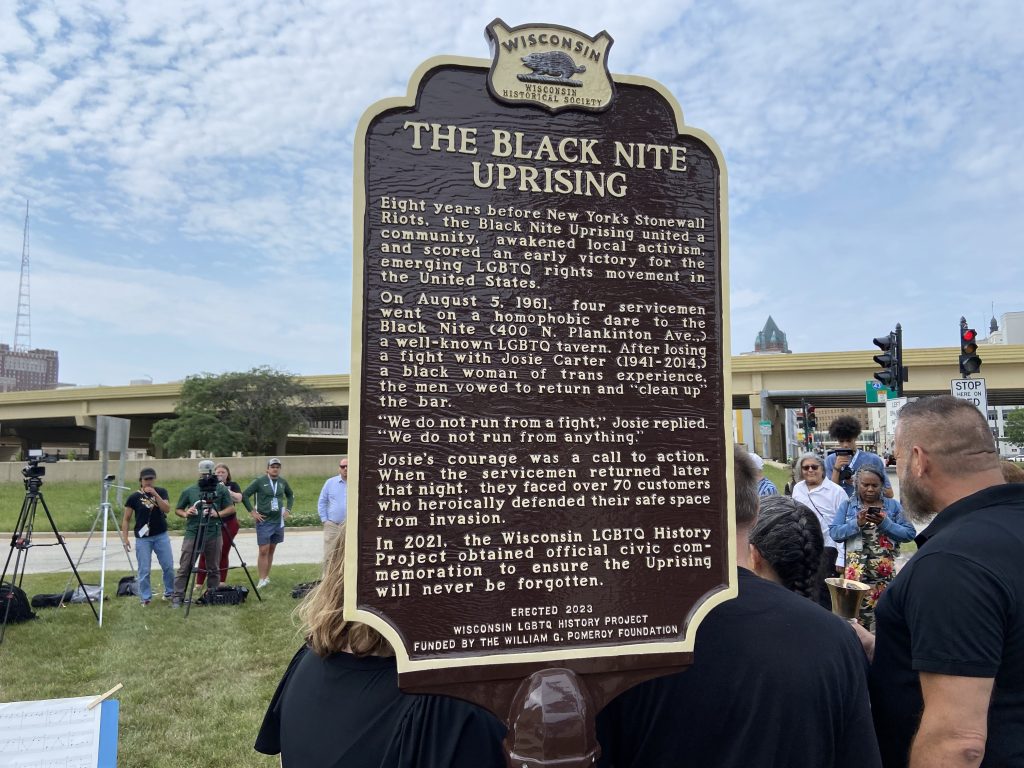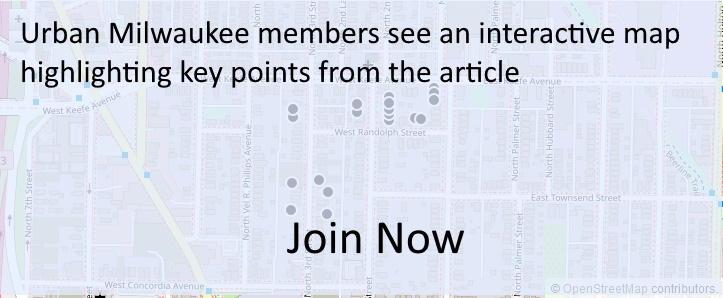Historic Marker Commemorating Black Nite Uprising Dedicated
First LGBTQ historic marker in Wisconsin erected in Milwaukee to remember site of uprising that occurred years before Stonewall.

Historic marker for Black Nite Uprising. Photo taken Aug. 5, 2024 by Graham Kilmer.
The first LGBTQ historic marker in Wisconsin was dedicated on Monday, which was also the 63rd anniversary of the historic event the marker commemorates.
At the corner of N. Plankinton and E. St. Paul avenues, a plaque was erected by the Wisconsin Historical Society marking the location of the Black Nite Uprising, sometimes called the Black Nite Brawl.
During the 1961 uprising, members of Milwaukee’s LGBTQ community fought back against a homophobic attack. The event was eight years before the historic Stonewall uprising in New York City, which is often regarded as the seminal event that kicked off the gay rights movement.
The event takes its name from the Black Nite bar, which was a well-known gay bar and the site of the attack. The marker currently sits on a median between the freeway and E. St. Paul Avenue, which just west of where the now gone Black Nite bar stood, 400 N. Plankinton Ave. The tavern was one of several properties cleared to build Interstate 794 through Downtown.
But the story was almost lost to history.
Michail Takach, a curator for the Wisconsin LGBTQ History Project, told Urban Milwaukee he first heard the story of the brawl from Josie Carter, a Black transgender woman who was there and participated. He said the organization first learned of the incident after meeting Carter in 2006 and began working to uncover what exactly happened.
Later, in 2011, Brice Smith, a local independent historian working on a broader oral history project, captured Carter on tape relaying the story of bar patrons fighting off a homophobic attack.
“She shared the story with me of the Black Nite Uprising, as she had done for generations, sitting on a bar stool, just telling the story of what happened; and so much of queer, trans history has been shaped in exactly this way,” Smith told the Milwaukee County Landmarks Committee in 2022.
The new marker tells the story of the Black Nite Uprising:
On August 5, 1961, four servicemen went on a homophobic dare to the Black Nite (400 N. Plankinton Ave.) a well-known LGBTQ tavern. After losing a fight with Josie Carter (1941-2014) a black woman of trans experience, the men vowed to return and “clean up” the bar.
“We do not run from a fight,” Josie replied. “We do not run from anything.”
Josie’s courage was a call to action. When the servicemen returned later that night, they faced over 70 customers who heroically defended their safe space from invasion.
“Today we celebrate and acknowledge Josie Carter, who didn’t see herself as a hero but led a heroic fight, during a time when it was not popular to do so,” said Ricardo Wynn, a community advisor to the Wisconsin LGBTQ History Project.
Wynn noted that the Black Nite Uprising is an important moment in both Black history and LGBTQ history. “Black Nite not only speaks to story sharing and the power of story sharing, but helping us understand what happens when a story dies, because there was no one to tell it,” he said.
Tony Snell Rodriguez, the chair of the Milwaukee Equal Rights Commission, noted that the new historical marker is not only the first LGBTQ history but also the first recognizing a Black transgender woman.
Milwaukee County Executive David Crowley and Mayor Cavalier Johnson both presented official proclamations recognizing the Black Nite Uprising Monday.
Ald. Peter Burgelis, the first out-LGBTQ member of the Milwaukee County Board of Supervisors spoke to the importance of the marker, noting that that the LGBTQ community hasn’t always enjoyed vocal support from state and local government.
Update: This story has been updated based on additional commentary from Takach.

Existing members must be signed in to see the interactive map. Sign in.
If you think stories like this are important, become a member of Urban Milwaukee and help support real, independent journalism. Plus you get some cool added benefits.
Political Contributions Tracker
Displaying political contributions between people mentioned in this story. Learn more.
- August 13, 2015 - Cavalier Johnson received $25 from David Crowley






















It would nice if one of Milwaukees wealthy black investors rebuild the tavern on the location. I could see happening in the future of Milwaukee as leadship moves city backwards.
In what why has current Milwaukee leadership moving the city backwards? It is true they have re-established light rail (streetcar systems in many cities were eliminated because of lobbying by the fossil fuel and auto industries who wanted to eliminate competition to cars. Like light rails system in other major cities, the Hop has drawn an enormous amount of development dollars along the established line but also along proposed lines. The development adds to city, county, and state coffers.
Great news! Another step out of the closet toward rewriting dominant culture history that has been “white” washed and “straightened” up.
In recent years, gay bars and “gayborhoods” have been on the decline, or at least have been experiencing transformation, not because of LGBTQ+ phobia, but because so many members of the community are more comfortable being who they are in more milieus and because of technology/apps. (Franklin Further is, of course, old school, and will always enjoy belly-ing up to the bar!).
Yesterday is over and today is fleeting. Glad we have this marker as part of Milwaukee’s built space to remind us of what once was and who stood up for what.
Nobody actually stood up, lol Just was a bar fight.What got attention was men discovered men dressed in women’s clothes. During WWll Milwaukee Wisconsin had a reputation for military service members seeking R&R discovered not only women provided comfort but men were more available.
“Nobody actually stood up”
“men dressed in women’s clothing”
Can we at least remove the black/queer erasure and transphobia from these comment sections? I would love to share this article with some folks, but the bigoted language in the comments is a real deterrent.
Black Nite Tavern was a long way from where Negros were living in around Milwaukees court house zip code 53206.in the 1960s ÷ or – five years.